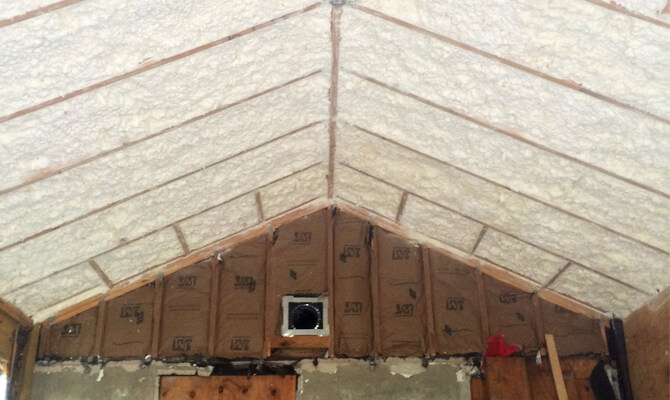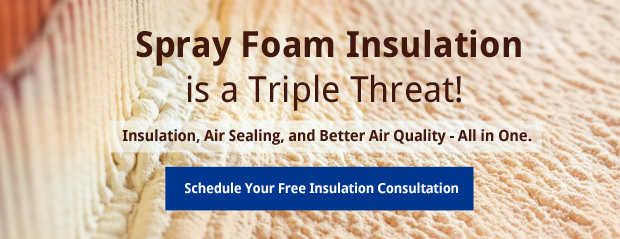
Insulation in your walls, floors, and ceilings helps keep your home cool in the summer and warm in the winter. But the story doesn’t end there. There are different insulation requirements and recommendations for other parts of your home. Here we’ll go over insulation for your attic and why it’s essential to your Florida home.
Why Should You Care About Insulation for Attics?
According to the Florida Department of Agriculture and Consumer Services, “Attic insulation is the most important location and best return on investment.”
- Heat rises, which means it ends up in the attic. The warm air you are paying hard-earned money to heat your home can get trapped in cooler weather. Instead of getting circulated back into your house to keep you and your family comfortable, it’s all in your attic, leaving the rest of your home chilly. Adequate insulation will keep your home cozy all year round.
- An attic without insulation will allow hot air to enter your home. In warmer weather, when you are trying to keep heat out, unwanted summer air can pose many problems. It will force your air conditioning system to work harder to keep your home cool, and the cooling costs on your utility bill could be high. Adding insulation can resist heat flow and keep your home cooler.
- Missing or inefficient existing insulation in the attic space means that cool air in your home can easily escape. For the same reasons we just went over, energy escaping your home will skyrocket your energy bills. A properly insulated attic can ensure cool air won’t escape and warm air circulates properly, making your home more energy-efficient.
- Installing insulation to your attic ceiling can reduce and prevent water damage caused by rainwater. Water leaking into your home puts your home at risk for mold growth, which leads to misery, expensive repairs, and potential health problems. Moisture penetrating your building materials, such as the ceiling or floor joists and crawl spaces, will eventually compromise the integrity of your entire home.
What is an R-Value?
An R-Value is a measurement of how well the insulation material resists heat flow. The higher the R-value, the better the resistance to heat flow. They are meant to act as radiant barriers, protect your home from mother nature, and keep moisture out.
Because of these attic-specific challenges, a higher R-Value is required for attics. Depending on the air conditioning and heating system you have, attics require an R-Value of 38-49. This is much higher than what is required for exterior walls, which need an R-Value of 13-18. In such an essential part of your home, you want to ensure your attic’s insulation is installed correctly.
How Much Attic Insulation Do You Need?
To determine how much insulation you need, measure the length by the width of your attic. An insulation contractor can reference package instructions for blown-in products to determine which height will give an R-value appropriate for your project needs.
An insulation professional will know what type and how much insulation your home will need and the local building codes. They will ensure proper insulation since spray foam can be difficult to get right.
What Type of Insulation is Right for Your Attic?
There are a few different types of attic insulation to choose from. Blown-in insulation, also called loose-fill insulation, is one option, and spray foam insulation is another option to keep your attic air flowing properly. Spray foam is likely the best attic insulation for your home, and your contractor will discuss proper insulating materials with you before beginning the job.
Spray foam insulation is designed to seal air leaks and to keep out water and mold. It keeps the wanted (and expensive) air inside your home while blocking the rest out. Its properties make it an excellent choice for attic insulation.
Installing spray foam insulation is a complex process, so it’s easiest to perform on new construction homes during the building phase. But if you have an existing home in need of attic insulation, don’t worry. Spray foam is great for any home, new or not-so-new.
Are you considering a home renovation? This is a perfect time to think about your attic insulation needs. Keep in mind that your home will need to vent for a few days to remove the fumes after installing spray foam insulation. However, once the fumes clear, your home will be safe for you and your family.
What is Spray Foam Insulation?
Spray foam insulation is one of the most popular choices for insulation material. It has an expanding foam agent that is used to fill the spatial cavities present in your home’s structure, which includes walls, floors, crawlspaces, ceilings, the attic, and more. One of the main benefits of spray foam insulation is that it doubles as an insulating material and an air barrier.
There are two different types of spray foam insulation. Open cell and closed cell foams are available for attic insulation. These are typically blown-in insulation and will make your home’s energy efficiency rating go up.
Open Cell
The open-cell spray foam is flexible and lightweight. It is an excellent attic insulation option for converted attic spaces. This type of insulation does not prevent moisture from passing through, so if you live in a humid climate or experience high humidity (like most of central Florida), open-cell attic foam insulation may not be the best option for the attic. Still, it can be considered for other areas of your home.
Closed Cell
Closed-cell spray foam is very dense and rigid. It will seal your attic space, making it airtight. It does not let moisture through, so closed-cell spray foam insulation is often chosen for high humidity climates like Florida.
Learn More About Proper Attic Insulation
Insulation is a must for Florida homes to keep the cool air in during the summer, keep warm air out during winter, and prevent moisture from getting in and wreaking havoc on your home. The type of insulation and installation method you use can make or break your energy efficiency efforts, so it pays to consult with an expert before deciding on which product best works for your needs.
We offer other types of insulation for your home, including rigid foam boards, loss fill insulation, and blown-in fiberglass insulation. If you’re looking for advice about what kind of insulation will work well in your home, don’t hesitate to contact Wattson Home Solutions today. We offer free estimates and are happy to answer any questions!
If it’s time to rethink your attic insulation, contact Wattson Home Solutions to schedule your free spray foam insulation consultation today. A spray foam expert will conduct an assessment and walk you through the best ways to improve your Florida home’s insulation.








